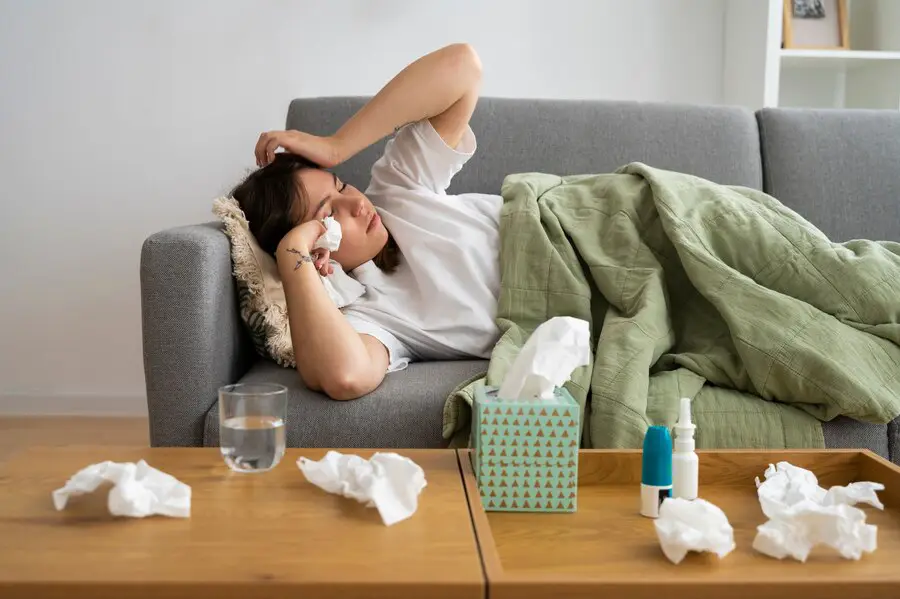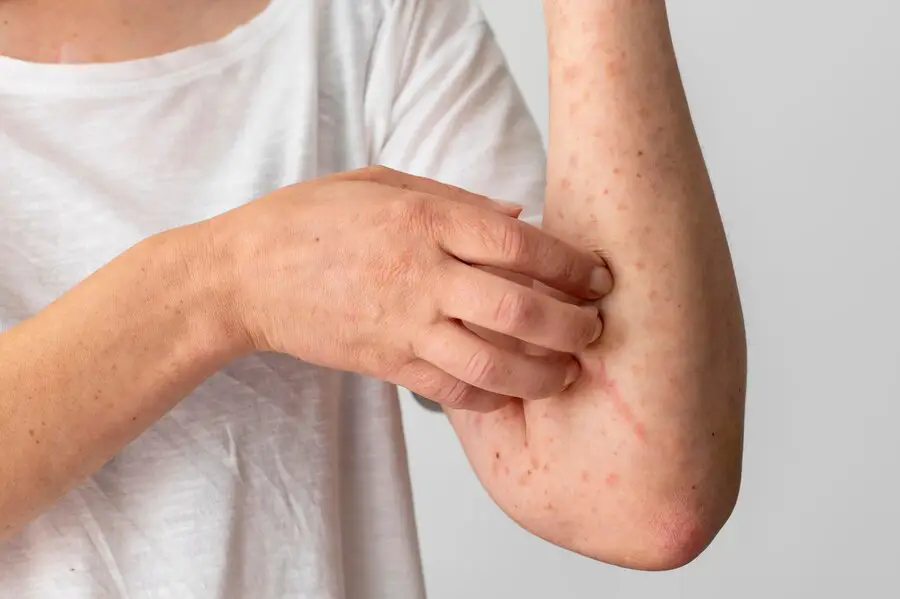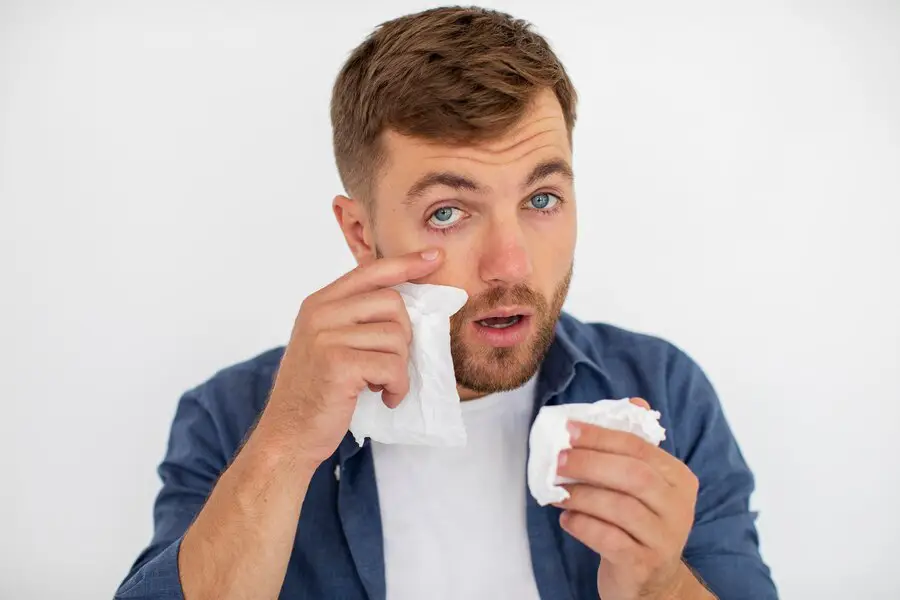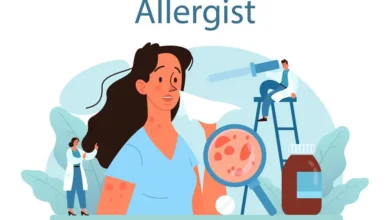Shocking Allergy Attack! Recognize Allergy Symptoms Faster!
After sneezing continuously, having itchy eyes, and a runny nose all the time, you might have an allergy attack rather than that irritating cold! Nowadays, allergies are shared so that we will look at them in this blog post. We will explore how to identify symptoms and get diagnosed. Never-ending sniffles Bye Bye. Finally, find relief.
What Are Allergies And Why DO They Occur?
Thousands of people worldwide are affected by allergies. Although prevalent, many people do not understand their nature or why they happen. Our next section will cover allergies and their different types, causes, and effects or symptoms.
What Are Allergies?
Allerg is an immune system response that is too strong for most people to bear when exposed to something seen as harmless. This reaction results from exposure to allergens such as pollen grains, dust mites, furry animals’ skin, insect bites or stings, and certain foods or drugs.
The immune system’s response to the allergen includes histamine and other chemicals. These chemicals induce typical signs of an allergic reaction, such as sneezing, itching, swelling, or hives.
Why do people have allergies?
Nevertheless, it is not entirely evident why some people suffer from allergies while others do not. Allergies can be thought of as genetically determined. If their parents have allergies, there is a fifty-percent chance that their child will develop them too, and if both parents have allergies, this percentage goes to over seventy-five percent.
Apart from genetic factors, other things may lead to the development of an allergy. On the other hand, exposure to environmental pollutants when you’re young may cause later sensitization. One possibility is when a baby is delivered by cesarean section rather than through the vagina, as this affects their gut flora composition.
Moreover, others argue that excessive cleanliness in our homes could precipitate allergies. During childhood, we lack exposure to potential allergens, hence developing hypersensitive immune systems in adulthood.

Types of Allergies and Signs & Symptoms
Although anyone can develop an allergy at a time, some people are more susceptible to allergies. Children and young adults have the highest chances of getting allergies, but they can affect people of all ages. Moreover, individuals having a family history of allergic diseases, including asthma, are also at increased risk.
In addition, various occupational activities put workers at greater risk of developing allergies due to frequent exposure to allergens. Also, living in polluted urban areas may result in some allergic reactions.
Allergies Explained: A person experiences an allergic response if their immune system is overactive to a particular allergen, which is a harmless substance. There’s no basis for determining why one person develops allergies while another does not; however, genetics and environmental factors might play a role.
In the next section, we will discuss various types of allergens and their symptoms so you will know if you or someone else is having an allergy attack.
Allergy Attack! Different Types of Allergies (Seasonal, Food, Skin, Etc.)
Millions are affected by allergic reactions, which are the most prevalent illnesses worldwide. Allergies occur when the body’s immune system reacts to normally harmless substances such as pollen, certain foods, or medication. Allergies cause people distress and prevent them from performing their daily routines to varying degrees.
It is essential to understand the different kinds of allergies to understand better these conditions and how they may be managed. These are common forms of allergies:
Seasonal allergies (or hay fever/allergic rhinitis). Seasonal allergies occur when a person’s immune system overreacts to airborne allergens at certain times during the year. Typically, these allergens constitute pollen from trees, grasses, and weeds, and their composition varies across locations and seasons.
Food Allergies—This category covers reactions whereby a victim’s organism responds to a specific meal like an enemy; thus, consuming such food results in an allergic reaction(s). Peanuts, dairy, tree nuts, shellfish, eggs, wheat, and soy are common allergenic foods.
Examples include skin allergies like contact dermatitis, which develops after direct contact with an irritant or allergen such as poison ivy and nickel. Such allergens as dust mites or pet dander trigger the chronic skin disorder eczema. (Insect sting allergies): People sensitized to insect venom may experience general allergic reactions to stings from insects like bees or wasps.

Allergies to Medications
Some individuals may be allergic to certain medications because of their components or interactions with other substances in the body.
It is worth mentioning that the types of allergies are not limited to these; there are rarer ones, such as latex allergies and mold allergies. Allergic reactions can range from mild (e.g., sneezing or hives) to severe (e.g., anaphylaxis). So don’t overlook any signs and symptoms; get proper laps and treatment.
Even though you might need to go and see your doctor to find out what is causing you the allergies, in this case, they should probably examine you through a physical examination; they may want to review your medical history with you; they might also suggest that some skin prick tests be done on you or even blood tests. After this is determined, specific treatments may provide relief according to how severe the allergy is. They may involve avoiding triggers, taking antihistamines or topical creams, or undergoing immunotherapy (allergy shots).
The knowledge that comes with understanding and managing the symptoms of these allergies is essential. It’s critical to see a physician if you believe you might have an allergy. However, with the right management plan, living with allergies can be much more manageable.
Common Allergy Symptoms
Symptoms vary depending on what one is allergic to. Hence, it becomes difficult to identify them as allergies. This article discusses some of the most common signs of frequent allergic reactions and how to identify them.
- Sneezing and Runny Nose: Common symptoms of allergies include sneezing and a runny nose. Such is usually triggered by pollen, dust, or pet dander that gets into the nasal cavities, causing an allergic reaction. You’re grabbing tissues more frequently than usual or blowing your nose often: If you’re grabbing tissues more regularly than usual, blowing your nose a lot can be a symptom of allergies. name
- Itchy Eyes: Allergies may also affect the eyes, causing redness and watery eyes. These are often called allergic conjuntos, and red, itchy, or watery eyes characterize them. They commonly occur in individuals with seasonal allergies or those who suffer from sensitivity to dust mites or mold, which may be found indoors, too.
- Skin Reactions: Sometimes allergies lead to skin reactions like rashes, hives, eczema outbreaks, or swelling. When the body comes into contact with allergens, two ways of reacting are possible: contact and ingestion.
- Persistent Coughs and Wheezing: Frequent coughs and wheezes without other respiratory symptoms (such as fever or congestion) may signal allergies. This symptom occurs in people with asthma caused by allergens (e.g., pollen, dust, etc.).
- Headaches: Some people may develop headaches as a result of their allergies. This is particularly true for those suffering from allergic rhinitis (hay fever). Headaches can also be caused by increased sinus pressure and congestion from exposure to allergens.
Common Allergies Symptoms If allergies are not managed, your daily activities will be affected. If you suspect having allergies but are unsure what causes them,…try keeping a record of your symptoms, which could help establish patterns and narrow down possible sources of allergens.
A healthcare professional can also perform an allergy test to help identify allergies. Some tests doctors use to diagnose allergies include skin-prick tests, radioallergosorbent testing (RAST), patch testing , and total IgE or specific IgE antibody tests.
Knowing the symptoms to look for and the proper diagnosis and treatment of allergies is key. Over-the-counter antihistamines, nasal sprays, or prescription medications can help relieve provide allergy symptoms. Furthermore, some patients will prefer having immunotherapy in the form of allergen shots, whereby they receive small amounts of injected allergen extracts at designated intervals until they can tolerate higher doses without adverse reactions.
Signs of allergy should not be taken lightly—common among these are…Below are some signs that show you have fallen victim to any type of allergy, including food like peanuts. These allergies can only be managed with appropriate recognition and control, leading to an everyday life free from these health problems and resulting in happy living through healthy conditions.

What Causes Allergies? Are They Caused by Environmental Factors, Genetics, or Lifestyle Choices?
Millions of people worldwide have allergies, which are a widespread condition. Some allergies are avoidable, while others can be mild to life-threatening emergencies. Identifying allergy triggers is key for proper diagnosis and treatment. This article examines three factors: environment, genetics, and lifestyle.
- Environmental Factors:
Allergies are often triggered by pollen, dust mites, mold spores, animal dander, and various chemicals, which provoke an immune response in sensitive individuals. For instance, when a person with hay fever inhales pollen, their body releases histamine and other chemicals to combat what it perceives as a threat, resulting in sneezing, coughing, a runny nose, watery eyes, and intense itching.
- Genetics:
Genetics significantly influence allergy risk; children of allergic parents are more likely to have allergies as well. However, individuals can be allergic and still differ in the specific types of allergies they have. To exemplify this, parents with hay fever can transmit asthma to their descendants instead.
- Lifestyle Choices:
Also, we become allergic because we make choices in our lifestyle. Smoking cigarettes may either exacerbate already existing allergies or increase individuals’ susceptibility towards developing allergies since it irritates the human respiratory system and decreases its ability to defend itself against allergens. In addition
Tests and exams for allergic reactions: Getting the correct diagnosis
A correct diagnosis is essential in the diagnosis and treatment of allergies. It includes specific tests and examinations to test for an allergic reaction and tell the allergen that is causing you a reaction. Diagnosis can help people manage their symptoms, avoid triggers, and implement treatment programs.
This test is widespread and is used to diagnose allergies. It involves applying allergens to your skin and pricking the surface. When allergic, one gets a reddish skin patch with swelling or itchiness around where it is pricked. The outcome will help you determine whether it is food or environmental allergies.
Another type of allergy test that can be done is a blood test (RAST), also known as a radioallergosorbent test. This examination checks for raised levels of a type of antibody called immunoglobulin E (IgE). You may be allergic to certain things if your IgE level is higher than usual.
When there are suspicions, healthcare providers sometimes recommend an oral food challenge. In this case, the person will eat small portions of suspected food allergens while under medical supervision to watch for potential reactions. My practice aligns with this view and argues for earlier introduction as a preventive measure, which comes from giving children peanut and egg preparations starting at about 4 months old.
No other tests exist except for patch tests to check for contact dermatitis and provocation tests to ascertain respiratory allergies. For these type-specific tests, patches containing small amounts of substances that may cause irritation are applied to the skin or inhaled through a mask with controlled quantities of allergens to watch for any symptoms.
Doctors can diagnose by carrying out physical examinations and tests and considering an individual’s medical history . It would be essential to be advised on how to track symptoms by keeping a diary.
Moreover, allergy testing must always be conducted in the presence of a health professional. They can also help interpret the results of any examinations and advise on how best to manage allergic issues.
This will be vital in handling allergic reactions because you must undergo multiple tests and exams to get a correct diagnosis. When correctly identified, the treatment program for allergies becomes comprehensive, resulting in healthier individuals.
Common Treatment Allergies: Medicines, Immunotherapy and Home Remedy
Once you realize that you have allergies, the next step is to consider your treatment alternatives. As allergies can significantly affect your life, good treatment will help manage the symptoms. This section will discuss three main groups of allergy remedies: medications, immunotherapy, and natural therapies.
Medications are typically the first line of attack for people with allergies. There are several classes of medication used to relieve symptoms associated with allergies, like antihistamines, which prevent histamine from causing allergic reactions to occur in the body. They make breathing difficult or cause itching in the eyes and running nose; they may even be responsible for wateriness and sneezing; decongestants help by narrowing blood vessels in a nasal passage congested due to colds or flu.
Corticosteroids work by reducing inflammation that might be present within the nasal passages, thus relieving swollen noses or runny noses, including itchy eyes, when taken orally as well as injected under or into them. However, leukotriene modifiers block a chemical called leukotrienes, which causes airway inflammation, leading to asthma-related allergies.
This means there are not many options for people with allergies. For instance, saline nasal rinses help rinse allergens and mucus from the nose and sinuses for some. Neti pots or bulb syringes filled with saltwater are also commonly used for nasal irrigations. Moreover, other natural remedies that can ease such symptoms include using a diffuser to inhale eucalyptus or peppermint oils, which will help you breathe again and eliminate congestion. Nonetheless, some research has shown that consuming honey in your locality may boost immunity against pollen allergens.
Note: The information herein is not advice on medicine and should not replace any medical treatment by natural means. If you have any doubt about something new that is recommended as a treatment option, always talk to your doctor before trying it out.
Medications, immunotherapy, and homeopathic approaches are some of the best ways to cure allergies. Because each individual’s signs and remedies for these ailments may be different, working closely with your physician is crucial in ensuring that you manage them to enhance your general living standards.
Consultation
One of the things we offer on our Treatments page is a top-notch consultation (known as consultation). You’ll meet with a medical professional to inquire about your symptoms, medical history, and possible culprits causing your allergy attack.
It starts with going to a doctor. This could be a primary care physician or an allergist/immunologist specialized in diagnosing and treating allergies. They require that you select lingthathdealsies and the complexities surrounding them.
During the consultation, the doctor will ask when the condition was diagnosed, how long it lasts, and what seems to trigger it. They will also ask whether any family member has suffered from any allergic reaction or any other illness that could be significant. So don’t try hiding anything from them so as not to get the wrong diagnosis and medication.
Your doctor will want to know about your symptoms and medical history during your consultation. If necessary, they may also run some tests on you. These will likely be skin prick tests or blood tests to pinpoint specific allergens responsible for what happened. Physical examinations done by your doctor can also detect skin or nasal passage-based allergic reactions.
Honesty is essential when talking with doctors, especially during consultations. So, if you have any questions, something makes you feel uneasy, or need to understand what is happening, please speak up.
After all necessary evaluations during your visit, the physician will share their findings with you and make an accurate diagnosis if necessary. If allergies are a good outcome, they will start individualized treatment focusing only on your needs.
Moreover, that’s not all there is to consultations since usually, one needs follow-ups to check on progress and adjust accordingly. Why skip these appointments? They help manage allergies by looking at signs while taking account of symptomatology so that you can do nothing but live with it without changing a single thing regarding the treatment plan.
FAQs:
Q: What causes an allergic reaction?
As a rule, allergic reactions often emerge due to inoffensive elements. For example, there are various substances against which an individual may get an allergy reaction, like pet dander, dust mites, some foods, and even medications.
Consequently, someone may experience symptoms like swollen body parts, eyes running with tears, fits of sneezing and itchiness, or even a runny nose.
Q: What are common allergens?
Common ones include but are not limited to, grass and tree pollen, molds, dust mites, certain foods (e.g., peanuts and shellfish), and insect venoms (e.g., bee stings). Smoking or exposure to pollutants can also act as allergens.
Synonyms, homophones, and other tools couldn’t work better than this. That being said, the symptoms for both allergies would vary depending on the type of condition and its severity. A person may experience sneezing, water eyes, runny nose, itchy skin or hives, coughing, and digestive issues such as nausea.
Q: Can you develop allergies at any age?
Yes! Allergic reactions can take place at any age. Although some individuals suffer from allergies from an early age, it is still possible for children to experience allergic reactions. In some cases, this could be attributed to inheritance, as specific allergens that were not harmful when they were younger become so later.
Q: How can I tell if I have allergies?
For instance, let’s say your symptoms seem to fit those of an allergic reaction because you think so yourself since your family members have also been diagnosed with such a condition before. If that happens, you must consult a medical professional for a diagnosis. The health care provider will likely conduct a physical exam and obtain your medical history before recommending skin prick or blood tests.
Q: How many types of allergic reactions are there?
Yes, but the extent varies from one person to another – some allergic reactions only cause a blocked nose, while others can be lethal. The most acute among them is anaphylaxis — a severe reaction that could be fatal and necessitates immediate attention from medical practitioners. Allergies must be identified and treated without delay so as not to aggravate.
Q: What can I do about my allergies?
The best method of dealing with allergies is to avoid substances that cause them. This may mean staying indoors on days with high pollen counts, using an air purifier, not allowing pets on furniture, or wearing masks around suspected triggers. Symptoms of allergies can also be relieved through different allergy treatments, such as antihistamines, nasal sprays, and allergy shots.
Yet again, if you still suffer from severe symptoms despite taking precautions and medication or persistently experiencing symptoms, it would be sensible to talk to your doctor for more advice on managing allergies.



